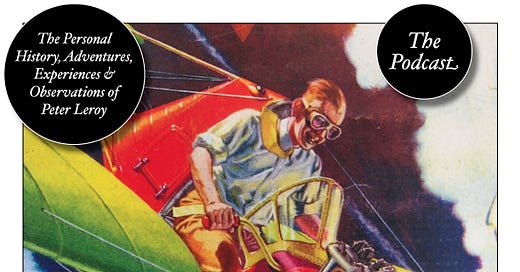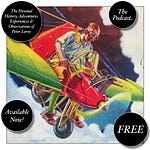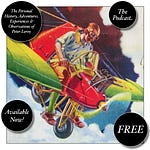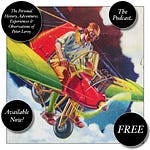62
SHE RAN TO THE BEDROOM and got the two bags that had been waiting there, and when she returned she drew a deep breath and said, “Am I ready? What do you think?”
“I think you’re ready for just about anything,” I said.
“But have I covered everything? I made a list—”
She pulled a drawer from an end table, pulled it completely out of the table, and turned it over to show that it was empty. Then she turned it around so that the people in the audience could see the envelope taped to the back of it.
“Remember this,” she said. “It comes in handy.”
From the envelope she took a folded piece of paper. She began to replace the drawer in the table, then shrugged, as in “What do I care?” and just set it on the top. She unfolded the paper.
“Let’s see,” she said. She scanned the list and said, “Oh, dear. There’s so much we haven’t covered. We did the tyranny of names, and all of that stuff, but not encrustation, the many layers of self, like the nacre that makes a pearl, and not aspiration, lofty aspiration, not the malleable past, not the figure at the center of my universe, the genius of boldness, the pleasures of traveling without a map, the glory of passion, the clarifying power of words, that dangerous narcotic called hope; and—oh! How could I have forgotten? How could I possibly have forgotten!” She took my hands, squeezed them, looked into my eyes, and said, “I almost forgot what I want from you.”
Slowly I turned, until I was facing the audience. I widened my eyes. I licked my lips. She kicked me.
“Listen, Peter,” she said. “When Greg decided that he’d rather be a filmmaker than a father, he didn’t take me with him when he started his new career, but he took my stories. He altered them, vulgarized them, made them violent and horrible. You’ve seen them,” she said, turning to the audience, “his versions of them—A Little Mischief and To Rarotonga. They made him the successful director you all know. I think it’s fair to say that I made him the successful director you all know. I have no doubt that sooner or later he will give us his version of all of this—” She indicated her house, her stage, her audience.
She came to me, put her hand on the side of my face, and looked into my eyes. “Someday,” she said, “when you’re ready, when you feel sure that you can do it, I want you to take my stories back. Get them back for me. Give them back to me. Do you know what I mean?”
“I think so.”
“I want to see my versions. I want to see Ariadne wind Theseus around her beckoning finger, use the boastful Athenian twerp as her ticket from stifling Crete to beautiful Naxos, land of dreams, where jolly Dionysus waits to make her happy ever after.”
“Okay.”
“I want to see Galatea imagine a Pygmalion who can carve from humble stone the masterwork she knows she is.”
“Wow,” I said. “I’ll give it a try.”
“That’s all I ask,” she said, then pouted and corrected herself: “Well—not really. I’m expecting quite a piece of work.” She leaned against me, held me, kissed me, ran her hands down my back and grabbed my buttocks and pulled me against her. “And if you think you deserve it, then when you get to this point in the story, you can sweep me up in your arms and carry me to the bedroom and—” She looked at her watch and frowned. “Oh, damn,” she said. “I guess not. I’ve got to catch that plane.”
She grabbed her bags and dashed to the door, where she turned and, though she faced the audience, addressed me: “Oh, Peter,” she said, “I’m heading into the dark unknown. I wish I had a clue.” She blew me a kiss, and she was out the door.
Murmurs rippled through the audience. She had left the door open. I walked over to it and watched her walk down the ramp and out the side door of the warehouse. She left that door open, too. It was a makeshift affair, crudely built of two-by-fours and a sheet of corrugated metal. It banged once in the wind with what I thought might seem a falsely theatrical echoing note of finality, but evidently not everyone interpreted it that way. People began getting up from their seats, and quite a few of them were bent on following Ariane. They pushed past the others and rushed out the side door as she had, setting the crude door flapping and slamming as they hastened outside. They stood a moment swiveling their heads to see where she’d gone, and then they hurried off, struggling into their coats and puffing their hot breath into the cold air.
[to be continued]
Have you missed an episode or two or several?
You can begin reading at the beginning or you can catch up by visiting the archive or consulting the index to the Topical Guide. The Substack serialization of Little Follies begins here; Herb ’n’ Lorna begins here; Reservations Recommended begins here; Where Do You Stop? begins here; What a Piece of Work I Am begins here.
You can listen to the episodes on the Personal History podcast. Begin at the beginning or scroll through the episodes to find what you’ve missed. The Substack podcast reading of Little Follies begins here; Herb ’n’ Lorna begins here; Reservations Recommended begins here; Where Do You Stop? begins here; What a Piece of Work I Am begins here.
You can listen to “My Mother Takes a Tumble” and “Do Clams Bite?” complete and uninterrupted as audiobooks through YouTube.
You can ensure that you never miss a future issue by getting a free subscription. (You can help support the work by choosing a paid subscription instead.)
At Apple Books you can download free eBooks of Little Follies, Herb ’n’ Lorna, Reservations Recommended, and Where Do You Stop?
You’ll find overviews of the entire work in An Introduction to The Personal History, Adventures, Experiences & Observations of Peter Leroy (a pdf document), The Origin Story (here on substack), Between the Lines (a video, here on Substack), and at Encyclopedia.com.














Share this post